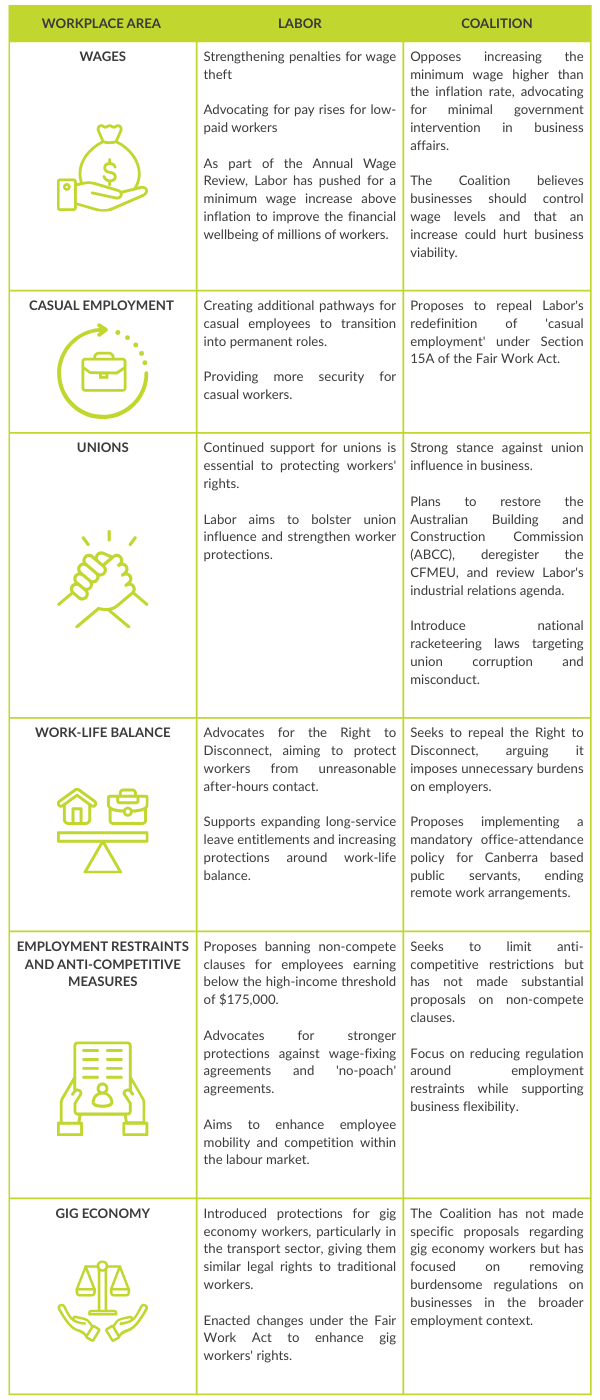The 2025 Federal Election is looming with the date now fixed as 3 May.
Both the Australian Labor Party (Labor) and the Liberal-National Coalition (Coalition) have signalled that their respective campaigns will focus on addressing the rising cost of living. Employment and industrial relations have consistently been major points of contention between the two parties, and this election is no different.
As both sides prepare for the upcoming vote, Australian businesses and employees are closely watching the developments, knowing that the outcome will have significant implications for employment law.
The approach each party takes towards industrial relations remains a key factor shaping their internal agendas, with differing philosophies and policies set to influence the future direction of the Australian workforce.
Comparison of Labor and Coalition Approaches to Key Employment and Industrial Relations Issues

Labor’s Industrial Relations Platform: Consolidation and Cautious Expansion
Over the past three years, the Labor government has pursued an agenda they describe as a ‘worker-first approach,’ introducing reforms focused on job security, wage growth, and greater accountability for employers. Since their rise to government in 2022, Labor has enacted some of the most significant industrial relations changes in recent decades. These include the Secure Jobs, Better Pay Act (2022), the Closing Loopholes Legislation (2023 to 2024), the Right to Disconnect Laws (2024), and most recently, the criminalisation of wage theft (2025).
Looking ahead, the government has signalled a shift from rapid reform to consolidation, suggesting that any future industrial relations changes will be measured and subject to broad consultation.
Right to Disconnect
When the right to disconnect was introduced in 2024, it attracted significant media attention. The law prevents employers from penalising workers who ignore unreasonable calls or emails outside work hours. While the practical impact has been relatively modest so far, the legislation has reinforced the Australian workforce’s growing demand for stronger work-life boundaries and greater flexibility.
The government has pledged to uphold this reform, with small businesses required to comply by August 2025. If Labor is re-elected, it is likely these protections will be expanded or strengthened in response to evolving workplace norms.
Casual to Permanent Conversion
From 26 February 2025, new laws will provide casual employees with greater access to conversion into permanent roles. After 6 months of employment, a casual employee can submit a written request to their employer to transition to permanent employment, with the same right available after 12 months for employees working in small businesses. These laws consider a range of factors beyond the employment contract, such as the actual pattern of work and the expectation of ongoing employment.
These changes aim to provide more security for workers who, despite working predictable schedules, have historically been classified as casuals.
For businesses that rely on casual labour to maintain flexibility, the reforms may result in higher wage costs and added administrative responsibilities. However, casual conversion remains dependent on specific criteria being met, and with proper planning and compliance, businesses can manage these changes effectively.
Wage Growth, Union Support, and Labour Hire Licensing
The Secure Jobs, Better Pay Act set the tone for Labor’s agenda by delivering stronger job security measures and supporting wage increases. These reforms are seen as part of a broader strategy to revitalise the union movement and restore collective bargaining.
Labor has also pledged to continue supporting union advocacy by maintaining the abolition of the Australian Building and Construction Commission (ABCC), which it views as a politically motivated body that hindered union activity.
The government is also pursuing a national labour hire licensing scheme, intended to harmonise existing state systems and create a uniform regulatory framework across the country. This would ensure that labour hire providers operate transparently and ethically, particularly in industries prone to exploitation.
In addition, the government is cracking down on anti-competitive practices, including wage-fixing agreements between employers and no-poach arrangements that restrict the movement of workers between companies. Both practices are set to be banned under new reforms.
Long Service Leave Reform
The Australian Council of Trade Unions (ATCU), in alignment with Labor, has advocated for a national framework for long service leave entitlements. At present, long service leave is regulated at the state and territory level, resulting in a fragmented and inconsistent system. A federal model would bring greater certainty and portability, particularly benefiting workers who move between states or shift industries.
Superannuation Payment Reform
In an effort to improve financial outcomes for workers, the Labor government has proposed a shift from quarterly to weekly pay cycle-based superannuation contributions. This change would align super payments with regular wages, improving retirement outcomes and reducing unpaid super liabilities.
While this reform is welcomed by employee advocate groups, it places significant pressure on payroll systems, especially for small and medium-sized businesses. Employers will need to review internal processes and possibly invest in new systems to stay compliant.
Ban on Non-Compete Clauses and Post-Employment Restraints
Labor has moved to restrict the use of non-compete clauses, arguing they have become too common across the employment landscape, even among low-wage workers. These clauses limit workers’ ability to seek new opportunities and contribute to wage stagnation by restricting competition.
Under the proposed reforms, non-compete clauses will be prohibited for employees earning under the high-income threshold, currently set at $175,000. Additionally, post-employment restraints will be limited for this income group, and agreements that prevent companies from hiring each other’s staff (commonly known as no-poach arrangements) will also be banned.
These changes are designed to give workers more bargaining power and mobility, which the government believes will improve wages and encourage innovation across industries.
Gig Economy and Transport Sector Reform
At the state level, the New South Wales Labor government has introduced new protections for gig workers, particularly those in the road transport sector. These laws expand the jurisdiction of existing tribunals to include gig economy workers such as couriers and food delivery drivers, giving them rights similar to owner-drivers and taxi operators.
The legislation complements recent federal amendments to the Fair Work Act, effective from August 2024, which broadened protections for platform-based workers. Together, these reforms aim to bring the gig economy closer to the standards of traditional employment, particularly in terms of safety, dispute resolution, and entitlements.
Coalition Position on Workplace Relations
The Coalition has signalled a return to a more business-centred approach to workplace relations, with a focus on reducing union influence, promoting physical attendance in the workplace, and increasing operational flexibility for employers.
Repeal of Labor’s Right to Disconnect Laws
If elected, the Coalition has pledged to repeal the recently introduced Right to Disconnect laws. These laws currently prevent employers from penalising staff who choose not to respond to unreasonable work-related calls, messages, or emails outside of their contracted hours. The Coalition argues that the legislation places unnecessary constraints on business communication and may hinder productivity, particularly in industries where after-hours contact is essential for operational continuity.
Critics of the repeal argue that removing these protections may blur the boundaries between work and personal time, potentially increasing stress and burnout. The Coalition, however, maintains that businesses should retain the flexibility to operate in a manner that suits their commercial needs.
Reversal of Changes to the Definition of Casual Employment
The Coalition has also announced its intention to reverse recent changes to the definition of casual employment under the Fair Work Act section 15A.
Under the Coalition’s proposal, the definition of a casual employee would return to the previous standard. This definition is based primarily on whether an employee was offered work with no firm advance commitment to ongoing and indefinite employment, according to an agreed pattern of work. The Coalition believes that this change would restore greater clarity and certainty for employers, particularly those in sectors that depend on a flexible and mobile workforce.
Union Oversight and Anti-Corruption Measures: The Coalition’s Position
The opposition Leader Peter Dutton has confirmed that a Coalition government will not repeal the “same job, same pay” legislation. This law requires labour hire workers to receive the same pay as directly employed workers performing equivalent duties.
The Coalition has also reaffirmed its longstanding commitment to tackling union corruption, with a renewed focus on the embattled Construction, Forestry and Maritime Employees Union (CFMEU) and the broader union movement. Central to this agenda is a promise to deregister the CFMEU and reinstate the Australian Building and Construction Commission (ABCC), a specialist watchdog previously tasked with regulating unlawful conduct in the construction industry.
In addition to industrial oversight, the Coalition has pledged to introduce national anti-racketeering legislation, drawing inspiration from the United States’ Racketeer Influenced and Corrupt Organizations (RICO) Act. These laws would enable authorities to pursue criminal charges against individuals, including union leaders, who are found to be involved in persistent patterns of unlawful conduct within their organisations.
Coalition Push for a Return to Office in the Public Sector
The Coalition had initially announced plans to mandate a return to office-based work for federal public servants, effectively ending the widespread work from home arrangements that became common during the COVID-19 pandemic. This policy is now only intended to apply to Canberra-based public sector employees, as confirmed by Opposition Leader Peter Dutton on 7 April 2025.
The Coalition argues that bringing staff back into the office will improve productivity, collaboration, and service delivery across government departments. They also suggest that a consistent in-person presence will strengthen workplace culture and accountability within the public sector. The Coalition has defended this suggestion by arguing that many job-share arrangements are available for employees.
However, the proposed return to office directive has generated mixed reactions. For employers in the private sector who rely on flexible working models to attract and retain talent, this shift may set an influential precedent. It could create pressure to adopt similar policies, potentially making it harder to maintain hybrid or remote work arrangements that many employees have come to expect.
While some organisations may welcome a renewed office culture and the structure it brings, others risk undermining employee morale and job satisfaction by imposing rigid work patterns. In a competitive labour market, limiting flexibility may present challenges in attracting skilled professionals, particularly those who value autonomy and work-life balance.
As the debate continues, employers should stay attuned to evolving political and cultural expectations around flexible work and assess how policy changes may influence both recruitment strategies and internal workforce planning.
Employment Law in a Minority Government
Experts have indicated that Australia could be headed towards a minority government with key players like the Greens, Teals and several long-standing independents outlining their commitments in the lead up to the election. These groups have indicated they will block supply if their demands, particularly in the industrial and employment relations sphere, aren’t met.
Greens
Paid Reproductive Leave
In 2024, several unions advocated for the introduction of reproductive leave into the Fair Work Act, aiming to better support workers dealing with menstrual health, reproductive health conditions, and related challenges. This movement gained further momentum when a Senate Inquiry endorsed the proposal, recognising the potential benefits for workplace wellbeing and gender equality.
The proposed entitlement would provide employees to 12 days of paid reproductive leave each year. In addition, the Greens have also suggested recognising menopause as a valid reason for requesting flexible working arrangements.
As of the date of this article, neither the Labor Party nor the Coalition have committed to supporting this reform.
Teals
The industrial relations reforms being advanced by the Teals focus on addressing key issues related to workplace fairness, gender equality, and the regulatory burden on small businesses. These reforms include:
For Employees
The Teals aim to further reduce sexual harassment and bullying in the workplace by committing to all of the Australian Human Rights Commission’s Respect@Work Report. This initiative seeks to create safer, more respectful environments for all employees, by ensuring better protection for workers as well as focusing on efforts to close the gender pay gap and promote wage increases for workers.
For Employers
The Teals advocate for increasing the employee threshold from 15 to 25. This change is intended to provide small businesses with greater flexibility and reduce administrative overhead, making it easier for them to operate while still upholding essential worker protections.
Jacqui Lambie Party
Senator Jacqui Lambie has been a vocal critic of Australia’s unfair dismissal laws, particularly highlighting the significant financial burden they impose on small businesses. Lambie has recently argued that each case can cost businesses over $10,000 in legal fees, even if the business wins.
As the next election approaches, Lambie could be pursuing amendments to the unfair dismissal process.
What Employers Should Do
In an era of rapid transformation within the industrial landscape, both employers and employees face increasing pressure to stay ahead of the curve when it comes to navigating the evolving world of employment law.
A key aspect of staying ahead of changes is ensuring that a company’s human resources (HR) and compliance frameworks are not only robust but also adaptable. Businesses need to be equipped to respond quickly to new obligations or regulations, whether that involves revising contracts, updating workplace policies, or implementing new training programs for staff. This flexibility enables companies to adjust their practices without major disruptions, ensuring they stay compliant even as employment law evolves.
In addition to being proactive in their monitoring of legislative changes, employers must also be prepared to implement changes swiftly. This may involve adjusting internal systems, such as payroll or compliance monitoring tools, to align with new superannuation regulations, wage theft penalties, or employment classifications. Effective communication with employees is equally important, as it ensures staff are aware of any changes that affect their rights and obligations.
Identifying these risks early on allows businesses to put measures in place to safeguard against legal challenges or disputes, while also taking advantage of new opportunities for improving employee engagement, retention, and productivity.
Ultimately, being proactive and adjusting workplace policies in response to legislative changes is not just about ensuring legal compliance, it is also about remaining competitive in the labour market. As workplace dynamics continue to evolve, businesses that stay ahead of regulatory changes will be better positioned to attract and retain talent, foster a positive workplace culture, and maintain operational efficiency. By embracing these changes with foresight and adaptability, employers can thrive amidst a rapidly evolving industrial landscape and continue to grow and succeed in an increasingly complex business environment.
If you wish to discuss any aspect of this article or require specialist advice or assistance in relation to an employment law issue, please do not hesitate to contact us.
This alert is not intended to constitute, and should not be treated as, legal advice.
This article is for general information purposes only and does not constitute legal or professional advice. It should not be used as a substitute for legal advice relating to your particular circumstances. Please also note that the law may have changed since the date of this article.





